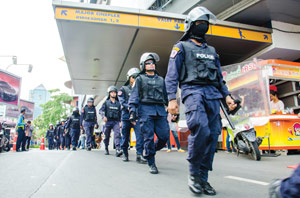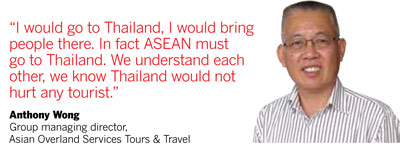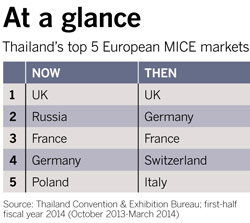
Political safety, not issues of accessibility or pricing, is the MICE industry’s chief liability today, as the swift impact of Thailand’s latest military intervention shows. By Raini Hamdi
When the Thai army invoked martial law on May 20, followed by a military coup two days later, many Thai hoteliers, DMCs and PCOs, described the move as being “actually good” in as far as its intention to restore peace and order in the country, which has been embroiled in a political stand-off for seven months, goes.
They were at pains to explain there is nothing sinister about a coup in Thailand – after all it’s the country’s 19th – that Bangkok is open, its people going about working, dining, shopping as before. Thai sellers interviewed at IMEX in Frankfurt the day martial law was imposed – the same day the show opened – said they were not surprised at all, although they thought it might be imposed a bit later.
Buyers, on the other hand, said they were shocked.
Clearly there was a gap between how Thai industry members and buyers perceive a military intervention in Thailand. The former sees it as a measure towards certainty. The latter sees it as anything but certain, and uncertainty is the added pressure they can do without.
An Australian buyer who pleaded anonymity asked why shouldn’t she divert a 100-pax incentive she was planning for Bangkok/Phuket in March 2015, a move that would give her peace-of-mind, rather than wait two to three months “for this to be over” – her DMC’s opinion, but her own heart believes that’s uncertain?
“We can divert now as, although planning has started, nothing has been signed. I’m about to confirm it but I’m really hesitant now. It’s far less stressful (to divert now) than being faced with the ups-and-downs of waiting two months before deciding – too hard. It’s probably best to move now,” she said.
Before the news of military intervention, she was also looking at Thailand for events towards the year-end and 2015. “But now I would not feel comfortable selling it to my clients. If something (untoward) happens, they would say, you knew it was a problem, why did you recommend it? It would reflect badly on me,” she explained.
Similarly, UK-based International Data Links Society (IDLS) was looking at Thailand for its conference next year, but communication secretary and director, Emma Jane Taylor, who visited Bangkok last August, said: “For us, due to the current situation, we won’t come to Thailand because a lot of our exhibitors and delegates get nervous about it. We had our conference in Athens in 2012 and because of the riots there, we lost a lot of delegates and exhibitors. I know they are not the same countries. But we would still delay going to Thailand, we’ll probably look at it for 2016.”
Asia, not just Thailand, lost a congress. Thailand would have been the first Asian country to host the IDLS, usually held over three days with between 400 and 600 pax. But the 2015 event would now be held outside Asia as “the other options in the region are quite expensive”, said Taylor.
The “loss of opportunities” as a result of the latest military intervention was what saddened Oriental Events’ executive director Suwat Jirahswakedilok, who came to IMEX with high hopes of future bookings, only to have them dashed right on the first day of the show, when Thai suppliers like him had to convince buyers why they should keep to existing plans – let alone talk of future bookings – as a result of the announcement of martial law.
“The announcement of martial law only made it worse. We’re the appointed agency for the Federation of International Pharmaceutical Congress where we’re expecting some 4,000 to 5,000 pax end-August. We provide the transportation, offsite dinner, pre- and post-conference programme, etc. Though it’s not cancelled, they’ve expressed concern.
“It’s the loss of (business) opportunities for the future that I am sad about. Who’s going to come to Thailand in 2015, 2016, 2017?”
He added: “The Thai conflict is not resolved easily. It has been going on since last November and there have been some casualties on both sides. The rich people who are involved in tourism say they ‘can’t stand it anymore’. But what about the little taxi driver, who is also impacted by it? These are the people who are really suffering.”
Suwat said the best-case scenario is that business will return earliest in the first quarter of 2015, but if the political situation turns ugly as in Syria or Ukraine, “then we’re dead”, he said.
“I have been in the industry for 25 years. I’ve never seen Thailand getting this kind of bad impression,” he said.
“This industry is too sensitive. It’s no longer just about giving good pricing and service. Buyers have a lot of choices. If one destination is down, there is always another to go to.”
Industry suppliers in neighbouring destinations such as Malaysia and Indonesia attest to an immediate spike in enquiries at IMEX from buyers considering to divert their business from Thailand. Jakarta Convention & Exhibition Bureau’s (JCEB) executive director/CEO Indra Sukirno, said it brought back memories of the People Power Revolution in the Philippines in the ’80s, which saw a sudden influx of meetings scheduled for the Philippines in Jakarta. “At the time, Thailand did not have the capacity to take in the last-minute changes. Today, sad though we are for our friends in Thailand, we find ourselves unable sometimes to pick up last-minute business as the domestic business is enough to fill up existing space,” said Sukirno.
However, new and bigger venues are opening in Jakarta, she said.
Joining JCEB at IMEX for the first time were three venues, Balai Sidang Jakarta Convention Center; Jakarta International Expo, which is adding another 30,000m2 to its current 35,000m2; and the new Indonesia International Exhibition and Convention Center offering a space of 100,000m2.
Similarly, Anthony Wong, group managing director of Asian Overland Services Tours & Travel, said there had been “a surge” of enquiries at IMEX from buyers when news of the martial law broke – never mind the coup two days later. “It’s a reality today that political safety, not accessibility, is the key. Look at the Crimea incident for example; the Europeans are boycotting Russia, the Russians are avoiding Europe in favour of South-east Asia – business can shift not just from one country to a neighbouring country but from one continent to another. Accessibility is not an issue because of the number of flights today. And that’s one reason why PCOs are seeing shorter booking lead times than ever – the whole world has become unpredictable,” said Wong.


He added: “I would go to Thailand, I would bring people there. In fact ASEAN must go to Thailand. We understand each other, we know Thailand would not hurt any tourist. I just feel sad that it’s the small vendors who are impacted, not the big boys who have deep pockets.”
Thailand Convention & Exhibition Bureau (TCEB)’s figures for the first half of its 2014 fiscal year (October 2013-March 2014), reflect shifts in European markets to Thailand.
Russia has replaced Germany as its number two European MICE market. Switzerland and Italy have dropped out of the top five, while Poland is now one of the top five MICE markets (see chart).
Incentives were the worst hit from October 2013 to March 2014, registering a decline of 30 per cent. Conventions were up 14 per cent and exhibitions 12 per cent during the period. Overall, Thailand suffered a 3.4 per cent shrinkage of the MICE market for the six months ending March 2014.
TCEB is targeting a lower number of MICE visitors in fiscal 2014, 987,000, compared with 1,013,502 in fiscal 2013. TCEB president Nopparat Maythaveekulchai, in a show of confidence, told TTGmice that the bureau does not intend to revise the target further downwards as a result of the latest military intervention and will stick to its goal of 987,000 visitors but higher-spending ones.
“This is the perfect opportunity to consider Thailand,” he said. “Apart from Bangkok, there are so many other choices.”
To attract quality meetings, he said TCEB is fostering industry-wide acceptance of new ISO standards for energy management, event sustainability, food safety, MICE security and business continuity. The bureau has also developed a Thailand MICE Venue Standard and National Skills Standard for the MICE industry.
At the same time, it is incentivising planners to consider Thailand through new MICE reward schemes, including Meetings Bonus, Conventions Bonus and Business Up 2 U (exhibitions).






















